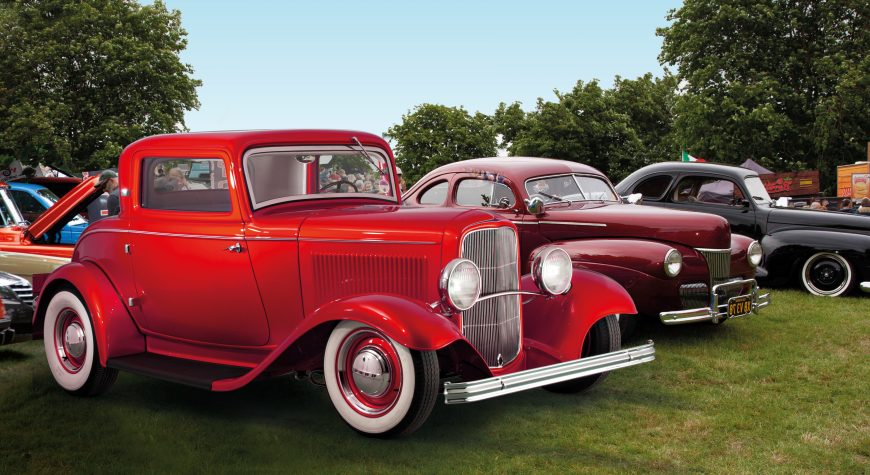A
Alex Ingram
Guest
Verdict
If you’re looking for a practical, comfortable and stylish seven-seat SUV, the latest Hyundai Santa Fe deserves to be on your shortlist. A rough petrol element of the hybrid system holds it back from the top rating, but beyond that there isn’t much to fault. We can’t wait to see how it compares with a Land Rover Discovery Sport. Based on this encounter, it could be close.
This is the new Hyundai Santa Fe, a revised version of the brand’s seven-seat challenger to the Skoda Kodiaq SUV, which has recently been updated.
Previously, we’d have considered the Nissan X-Trail competition for the Korean brand’s largest SUV too (and the Kia Sorento, which under the skin is largely similar to the Santa Fe), but gradual improvements over the years and a push upmarket have turned Hyundai’s largest SUV into a proper Land Rover Discovery Sport rival.
- SEE MORE Best large SUVs on sale 2021
The latest facelift only helps to reinforce that, too. Calling the latest changes to the model first launched back in 2018 merely a facelift is understating the extent of the updates though. For 2021, the Santa Fe features significant changes to the styling inside and out, new cabin tech and the introduction of hybrid powertrains.
A reshaped, enlarged grille dominates the front end, with its outer edges blending into the main headlamp units. Narrow LED units sit higher up the nose, with a new bumper design below. The side profile is largely unchanged, but around the back the latest Santa Fe now gets a light bar connecting the two tail lamps, and a cleaner bumper design.
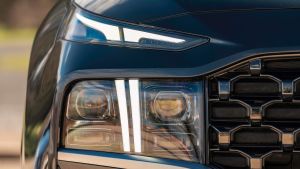
Hyundai Santa Fe Hybrid - front lights
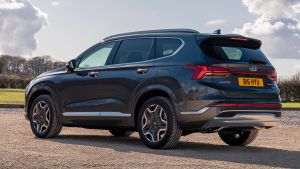
Hyundai Santa Fe Hybrid - rear static
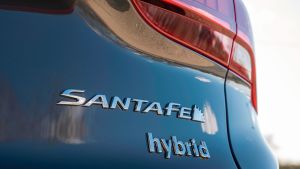
Hyundai Santa Fe Hybrid - rear badge
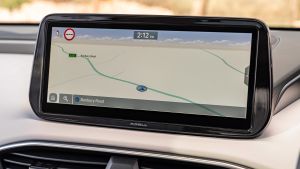
Hyundai Santa Fe Hybrid - sat-nav
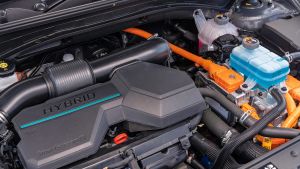
Hyundai Santa Fe Hybrid - engine
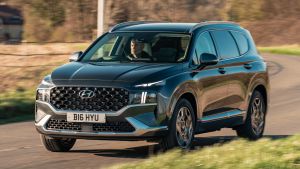
Hyundai Santa Fe Hybrid - front action
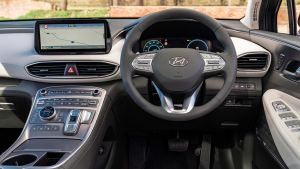
Hyundai Santa Fe Hybrid - dash
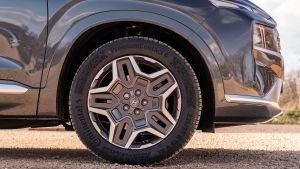
Hyundai Santa Fe Hybrid - wheel
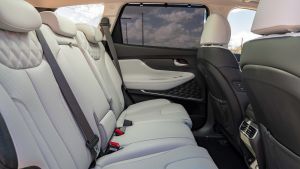
Hyundai Santa Fe Hybrid - rear seats
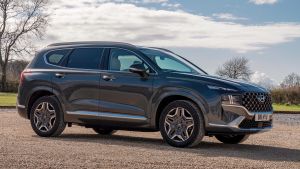
Hyundai Santa Fe Hybrid - front static
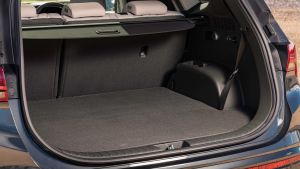
Hyundai Santa Fe Hybrid - boot
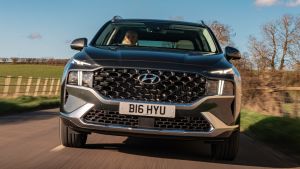
Hyundai Santa Fe Hybrid - full front
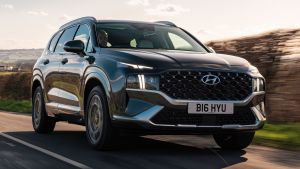
Hyundai Santa Fe Hybrid - front
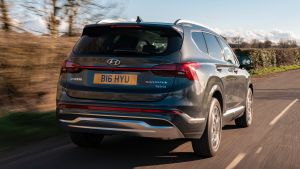
Hyundai Santa Fe Hybrid - rear
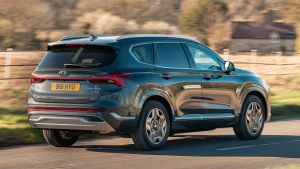
Hyundai Santa Fe Hybrid - rear action
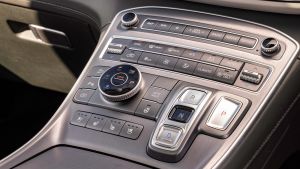
Hyundai Santa Fe Hybrid - centre console
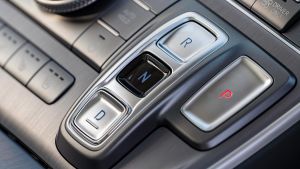
Hyundai Santa Fe Hybrid - transmission
The cabin feels plusher than ever, with a new central part of the dashboard sloping gently from the central air vents towards the console between the front seats. Relative to the button-shy approach taken by many rivals now, the Santa Fe’s sheer number of physical switches is almost bewildering at first, with the climate functions, infotainment shortcuts and gear/driving mode selections all located in this area. Even if it does look a little more fussy than some competitors, it doesn’t take long to get used to the placement of all of the key controls.
The standard kit on offer is excellent. There’s two trim levels to choose from, with this top spec Ultimate getting everything that Hyundai can throw at it. A panoramic glass roof, ventilated front seats, a head-up display and the semi-autonomous Highway Drive Assist are all included. So is a 360-degree camera system, images from which are displayed on a 12.3-inch digital instrument panel when turning or changing lanes to eliminate blind spots.
The Premium does without those features, but as standard it still gets full LED headlights, heated front seats with electric adjustment, adaptive cruise control, a 10-speaker Krell hi-fi, and parking sensors with a reversing camera. Kia Sorento aside, little at this price point comes close to offering so much tech.
It’s hard to knock the quality, either. Everything feels solidly put together, and with this test car’s optional Luxury pack, which adds Nappa leather seats, suede headlining and a faux leather wrapped dashboard, it comes close to - even if it doesn’t quite match - the Land Rover Discovery Sport’s sense of occasion.
The same can be said for the infotainment system which, though not quite as slick or as pretty as the new set-up in the Land Rover, is still a great unit. A 10.25-inch touchscreen sits on top of the dashboard, and the interface is easy to use, it loads quickly enough and it gets smartphone connectivity as standard. Devices can be stored neatly by posting them into a clever vertical space in the centre console.

Hyundai Santa Fe Hybrid - front lights

Hyundai Santa Fe Hybrid - rear static

Hyundai Santa Fe Hybrid - rear badge

Hyundai Santa Fe Hybrid - sat-nav

Hyundai Santa Fe Hybrid - engine

Hyundai Santa Fe Hybrid - front action

Hyundai Santa Fe Hybrid - dash

Hyundai Santa Fe Hybrid - wheel

Hyundai Santa Fe Hybrid - rear seats

Hyundai Santa Fe Hybrid - front static

Hyundai Santa Fe Hybrid - boot

Hyundai Santa Fe Hybrid - full front

Hyundai Santa Fe Hybrid - front

Hyundai Santa Fe Hybrid - rear

Hyundai Santa Fe Hybrid - rear action

Hyundai Santa Fe Hybrid - centre console

Hyundai Santa Fe Hybrid - transmission
Hyundai says that it has improved cabin space all round, with 34mm more legroom for second-row passengers than before - an increase which Hyundai claims results in class-leading space.
The third row can be accessed electrically using a switch that slides the middle seats forwards; if those passengers are willing to sacrifice just a fraction of that new-found space, then adults of an average height can get comfy enough right at the back. Those sixth and seventh seats feature a separate air conditioning control, and each gets a cupholder, too. With the third row of seats folded flat into the floor, there’s a vast 571-litre boot.
It’s all change under the bonnet, where the outgoing 2.2-litre diesel is replaced by a choice of hybrid systems. The range tops out with a 261bhp plug-in hybrid model where a 13.8kWh battery allows for an electric-only range of 36 miles. Official CO2 emissions of 37g/km places the Santa Fe PHEV into the 11 per cent Benefit in Kind tax bracket for 2021/22.
Here, we’re driving the regular hybrid. This uses a smaller 1.49kWh battery that sends energy to a 59bhp electric motor. The battery is charged both through brake regeneration and by the combustion engine.
The engine in question is a 1.6-litre turbocharged petrol unit, and unfortunately it’s the weakest area of the new Santa Fe. While performance feels at least as strong as the old diesel - combined with the e-motor, there’s a healthy 227bhp on tap - the 1.6-litre unit sounds coarse throughout the rev range, whether it’s working hard or not.

Hyundai Santa Fe Hybrid - front lights

Hyundai Santa Fe Hybrid - rear static

Hyundai Santa Fe Hybrid - rear badge

Hyundai Santa Fe Hybrid - sat-nav

Hyundai Santa Fe Hybrid - engine

Hyundai Santa Fe Hybrid - front action

Hyundai Santa Fe Hybrid - dash

Hyundai Santa Fe Hybrid - wheel

Hyundai Santa Fe Hybrid - rear seats

Hyundai Santa Fe Hybrid - front static

Hyundai Santa Fe Hybrid - boot

Hyundai Santa Fe Hybrid - full front

Hyundai Santa Fe Hybrid - front

Hyundai Santa Fe Hybrid - rear

Hyundai Santa Fe Hybrid - rear action

Hyundai Santa Fe Hybrid - centre console

Hyundai Santa Fe Hybrid - transmission
It’s a shame, because there’s little to grumble about with overall refinement. The only other flaws to the drive are minor: there’s a slight low-speed fidgetiness to an otherwise soft and relaxing ride (our Ultimate test car rode on 19-inch wheels - Premium models get smaller 17-inch items), and the sheer size of the car does throw up a hiss of wind noise at motorway speeds.
If you spend much of your time driving around town, then it won’t break the bank to fuel, either. Officially, this four-wheel drive model manages just over 40mpg, and that seems not too far off the mark in real-world urban driving. At 70mph, mid-thirties mpg is more realistic.
A seven-seat SUV that weighs the best part of 1.9 tonnes is unlikely to be fun to drive, but the Santa Fe feels secure and offers up plenty of grip, which is all that matters. The four-wheel drive system - standard on the PHEV, optional on the hybrid - plays a part. Throw the Santa Fe into a corner too quickly and it’s possible to feel the influence of its torque distribution system shuffling drive and nipping brakes to hold off understeer.
Prices for the Santa Fe Hybrid range from £40,250 for a Premium with front-wheel drive, to £45,815 for the four-wheel drive Ultimate. The PHEV costs £45,715 in Premium trim and £49,010 for the Ultimate.
Depending on where you aim for in the range, either the Kia Sorento or the Santa Fe can represent better value for money: the cheapest Sorento Hybrid, which still has four-wheel drive, costs £39,110, but at £47,210, the top spec hybrid in ‘4’ trim is pricier than the equivalent Santa Fe, so take a close look at the specs and pricing before you make a decisions. But make no mistake, the Hyundai Santa Fe is very good indeed.
| Model: | Hyundai Santa Fe Ultimate 1.6 T-GDi Hybrid 4WD |
| Price: | £45,815 |
| Engine: | 1.6 4cyl turbo petrol hybrid |
| Power: | 227bhp/350Nm |
| Transmission: | Six-speed auto, four-wheel drive |
| 0-62mph: | 9.1 seconds |
| Top speed: | 116 mph |
| Economy/CO2: | 40.4mpg/159g/km |
| On sale: | Now |
Continue reading...

